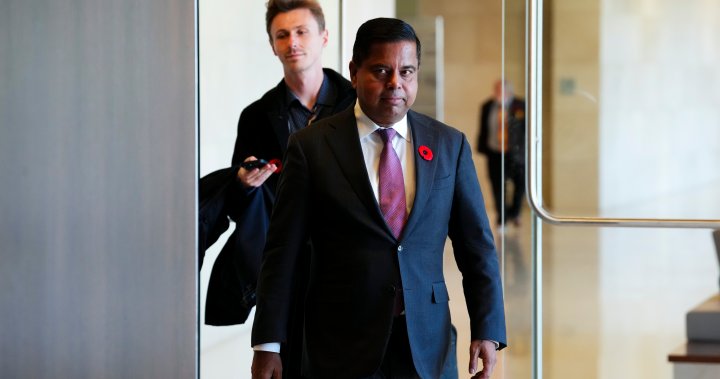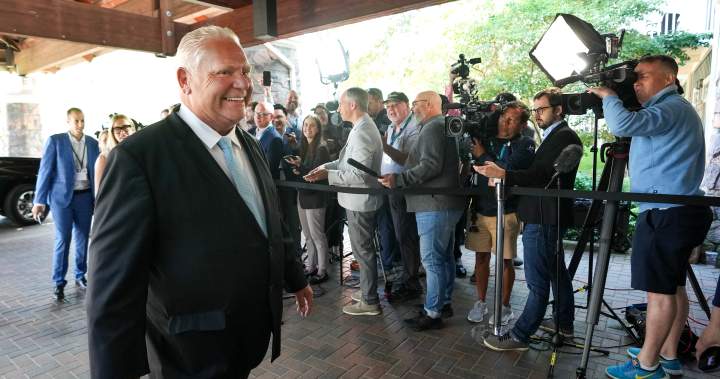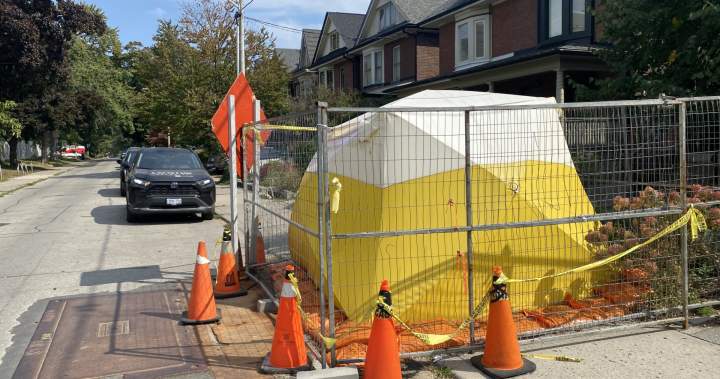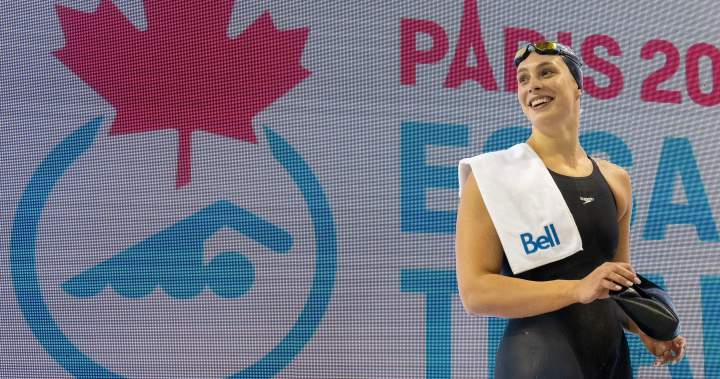
Senthuran Selvakumaran has been trying to immigrate to Canada since 2005, but the CBSA has denied his application on the grounds he was a member of the Tamil Tigers.
Federal Court


Before he was appointed to the federal cabinet two years ago, Public Safety Minister Gary Anandasangaree wrote letters urging Canadian officials to approve the immigration application of a man they had determined was a member of a terrorist organization.
The letters, dated 2023 and 2016, were written on Anandasangaree’s House of Commons letterhead and sent to the Canada Border Services Agency on behalf of an alleged member of Sri Lanka’s Tamil Tigers who wanted to move to Toronto.
Although Canadian immigration officials had repeatedly rejected Senthuran Selvakumaran as an immigrant due to what they described as his “protracted involvement” in the Tigers, Anandasangaree asked them to reverse their decision.
Also known as the Liberation Tigers of Tamil Eelam, or LTTE, the Tamil Tigers fought a lengthy civil war against the Sri Lankan government. The conflict ended in 2009 but the Tigers remain on Canada’s list of terrorist organizations.
In his most recent letter to the CBSA, Anandasangaree said the agency’s refusal to grant Selvakumaran permanent residence had separated the 48-year-old Sri Lankan from his Canadian wife and child, which the Toronto-area MP called “cruel and inhumane.”
“I respectfully ask that you review and reconsider this decision,” Anandasangaree wrote on July 19, 2023, when he was in the last days of his term as Parliamentary Secretary to the Minister of Justice and Attorney General.
Anandasangaree’s constituency assistant emailed the letter directly to the law firm representing Selvakumaran in his case against the government on July 25, 2023, according to records on the case released to Global News.
The following day, Anandasangaree received his first cabinet appointment as Minister of Crown-Indigenous Relations in the government of Prime Minister Justin Trudeau. He was sworn in as Public Safety Minister on May 13.

Asked about the matter, Anandasangaree said in a statement on Monday that it would not be appropriate to comment on a matter before the courts but that the “letters in question here date from before I entered cabinet.”
“As minister, I have never sent a letter seeking ministerial relief in an immigration matter. When I was appointed minister in July 2023, I instructed my constituency staff to no longer provide such letters,” he said.
Read the minister’s full statement here
In his new portfolio, Anandasangaree has been given the task of helping fend off a White House trade war by bringing in legislation to toughen Canada’s borders, which President Donald Trump has complained are a threat to the United States.
But documents on Selvakumaran’s case suggest that Anandasangaree’s support for the would-be migrant may have put Canadian public safety officials in a potentially awkward position: standing up for border security against the wishes of the MP who is now their minister.
The recommendation to deny Selvakumaran’s application for permanent residence was signed on Oct. 12, 2023, by Erin O’Gorman, the president of the CBSA, who now reports to Anandasangaree.
Her report mentioned a “letter from Canadian Member of Parliament Gary Anandasangaree, wherein the MP expresses his support for reunification of Mr. Selvakumaran’s family in Canada.”
She wrote that the letter was among several factors border officials took into account before coming to their decision, but that the CBSA’s “predominant considerations” were national security and public safety.
The minister’s involvement in the case came to light as a result of a court challenge launched by Selvakumaran, who used Anandasangaree’s endorsement to bolster his bid to join his family in Canada.
On Wednesday, the Federal Court rejected his appeal. The judge’s decision said the evidence put forward by Selvakumaran included a letter of support from an MP, whom she did not name.
Global News reviewed the public court file in Ottawa and found it contained two letters signed by Anandasangaree in which he identified himself as a Member of Parliament.
“MP Gary Anandasangaree supported Mr. Selvakumaran’s application for ministerial relief prior to taking on his current ministerial role,” Lorne Waldman, Selvakumaran’s Toronto lawyer, said on Monday.
“Members of Parliament often choose to do so when approached by their constituents who have compelling circumstances, and there is nothing improper in doing so.”
Waldman said he was disappointed with the court’s ruling. He said his client “made a mistake well over two decades ago and claimed refugee status in the United Kingdom based on a false story of relatively low-level involvement with the LTTE.”
“He and his family have been attempting to correct the record and ask for compassionate consideration since 2007. The family will continue to suffer due to the court’s decision.”
Prime Minister Mark Carney’s office did not respond to questions by deadline.
In his statement to Global News, Anandasangaree said he had recused himself from decisions related to the Tamil Tigers and the World Tamil Movement, which Public Safety Canada alleges is its Canadian front organization.
The recusal was a response to what “scurrilous and wrong” allegations, Anandasangaree said. He said he would also refrain from making decisions concerning those he had helped before joining cabinet.
“In the discharge of my duties as minister, I cannot, and will not, make decisions on any matter wherein I advocated for a constituent,” he said. “This includes ministerial relief and stays of removals.”
It was a “routine matter” for MPs from all parties to provide letters of support for constituents, he said. But Selvakumaran’s case raised national security questions that are not as straightforward as a typical immigration file.
In his letters of support, Anandasangaree downplayed the CBSA’s concerns about Selvakumaran, calling the decision to bar him from Canada due to his alleged role in the Tamil Tigers an “error.”
He claimed there were “no records … suggesting reasons he might be inadmissible to Canada” — although CBSA officials had compiled a detailed report assessing the evidence they relied on to make their decision.
The CBSA’s report on Selvakumaran said he had acknowledged that he began working for the Tigers in 1992 when he joined a friend who distributed propaganda for the group. He continued doing so until 1998, the report said.
The LTTE attacked civilian centres and assassinated politicians such as Indian Prime Minister Rajiv Gandhi, the CBSA wrote in its report recommending the rejection of Selvakumaran’s application for permanent residence.
The Tigers also ran an “extensive” fundraising, propaganda and arms procurement network in Sri Lanka and “within the Tamil diaspora,” the CBSA wrote in its 29-page report.
The network raised millions for the Tigers in Toronto and other Canadian cities, partly through intimidation and extortion, according to the RCMP. “Although the LTTE was militarily defeated in May 2009, fundraising efforts continue, particularly within the diaspora,” the report said.
Canadian officials are not alleging that Selvakumaran committed any attacks, but said his involvement as a propaganda distributor had “the effect of facilitating the organization’s efforts to spread its messaging at a time to LTTE was actively involved in committing terrorist acts.”
Timeline: Click through a slideshow of photos and documents
In asking the CBSA to approve Selvakumaran’s permanent residence, Anandasangaree’s letters focused on the emotional toll on his family.
Selvakumaran’s daughter was “growing up without both parents,” and lacking “emotional connection to her father,” while his wife, “has endured a lot of emotional and psychological stress over the prolonged separation from her husband,” the MP wrote.
“Separating the family for such a prolonged period of time, and depriving the child of the love and support of both parents is rather cruel and inhumane,” he wrote in his latest letter to the CBSA.
For its part, the CBSA wrote in its report that Selvakumaran’s daughter was born almost a decade after he was informed he was not allowed into Canada due to membership in a terror group.
“It should be noted that Mr. Selvakumaran would have been aware, when he started a family with his wife, that he was inadmissible to Canada; he therefore would have been cognizant of the fact that he might not be in a position to join his wife and daughter,” it said.
Hundreds of pages of Federal Court documents released to Global News describe Selvakumaran’s repeated attempts to immigrate to Canada from Sri Lanka over the past two decades.
Each time, immigration officials rejected him over his alleged membership in the LTTE. His appeals to the courts, in 2012, 2019 and 2024, were all dismissed — most recently last week.
Throughout his dealings with Canada’s immigration system, he has given evolving versions of his past — at first providing details of what he said was his role in the LTTE, and then denying any involvement at all.
He initially sought asylum in the United Kingdom, where he told immigration authorities his duties with the LTTE included delivering the group’s propaganda newspapers from house to house.
He also said he had put up “notices of deceased LTTE members,” according to the CBSA report detailing his immigration history in Canada and the U.K., where he resided from 1998 to 2006.
He got involved “not only because he wanted to help the organization, but also because he was paid for his work,” the CBSA wrote. He later said it was “more of a compulsion by the LTTE that all residents should help them in their offensive against the Sri Lankan armed forces.”
Britain rejected his refugee claim, citing his lack of credibility. The U.K. did not make any finding on whether he was a member of the LTTE. He then married a woman from Canada. The wedding took place in the U.K. He was still living in London when he applied to immigrate as her spouse in 2005.
In 2007, during an interview at the Canadian High Commission in the Sri Lankan capital Colombo, Selvakumaran altered his story but still maintained he had worked for the Tamil Tigers.
The visa officer found that Selvakumaran’s “self-admitted paid work for the organization as articulated in statements to the U.K. authorities, and confirmed in the 2007 interview, serve as a sufficient basis for the refusal on security grounds.”
Following his rejection, Selvakumaran changed his story again. This time he said he had fabricated his account of working for the LTTE as a result of “bad advice.” He also claimed the Canadian visa officer had “intimidated” him.
He began asserting he had “never done any work for the LTTE willingly or for payment.” But immigration officials pointed to holes in his timeline and rejected his permanent residence applications.
On Sept. 1, 2016, he tried a new approach: he applied for “ministerial relief,” a process that allows foreign nationals who are inadmissible to Canada to appeal to the minister of public safety for permanent residence.
He denied ever working for the LTTE, but at the same time said that even if he had, he was not a threat to Canada because his alleged involvement was “non-violent, indirect and extremely limited.”
It’s unclear how the case came to Anandasangaree, who became a Liberal MP in 2015 after stints as a youth activist, lawyer and representative of the Canadian Tamil Congress, a national non-profit group.
Anandasangaree had been in office for less than a year later when he penned his first support letter for Selvakumaran on Sept. 28, 2016. The court decision suggested that Selvakumaran’s wife Nilushie lived in Anandasangaree’s riding.
“The separation has wreaked havoc on Nilushie’s well-being and state of mind causing depression, anxiety and stress,” Anandasangaree wrote, asking the CBSA to contact his office with “any questions or concerns.”
Selvakumaran has argued the family could not live together in Sri Lanka because his wife “regularly becomes ill” when she visits the island. He also pointed to the country’s food, medicine and gas shortages.
The CBSA wrote that while the letters from Anandasangaree and others went in Selvakumaran’s favour, they were outweighed by his “protracted involvement” in a terrorist group at a time it was committing acts of violence.
Anandasangaree’s second letter of support to the CBSA was dated during the time the immigration agency was in the final stages of deciding whether Selvakumaran qualified for ministerial relief.
The letter echoed Selvakumaran’s claims that had been untruthful when he told immigration officials he had worked for the LTTE. “He was wrongfully counseled by his legal representative to lie,” Anandasangaree wrote.
But the CBSA president’s report concluded that Selvakumaran had “not provided a satisfactory explanation to warrant disregarding his initial statements made in the U.K.”
“As such, the CBSA’s assessment of national interest considerations that follows is based on the premise that Mr. Selvakumaran was a member of the LTTE, who engaged in paid work for the organization from 1992 until 1998, as outlined by him in his original account.”
On Jan. 29, 2024, Dominic LeBlanc, who was minister of public safety at the time, signed off on the CBSA’s recommendation that Selvakumaran should be denied ministerial relief.
Selvakumaran appealed his refusal to the Federal Court, but on July 9, Justice Glennys McVeigh ruled he had failed to show the CBSA decision rejecting his application for ministerial relief was unreasonable.
The ruling said the CBSA had “considered positive factors” such as the “letters of support attesting to his good character” but had “reasonably focused” on national security and public safety.

Doug Ford is leading the country’s premiers in a potentially tense meeting with several prominent First Nation groups as a push to streamline approvals in the face of tariffs from the United States creates ruptures in the relationship.
Monday’s meeting will include Canada’s premiers and leaders from the Assembly of First Nations, the Métis National Council and the Native Women’s Association of Canada, among other Indigenous groups, for a closed-door discussion.
Ahead of the talks, Victoria Pruden, president of the Métis National Council, said the country must balance “the needs for economic participation that benefits Métis and their citizens and making sure those benefits don’t come at the expense of duty to consult, consultation, respect for Indigenous rights holders in general.”
The event, held on the edges of the Council of the Federation in Huntsville, Ont., comes at a time when tensions between First Nations leaders and the Crown are high.
Last week, a coalition of nine Ontario First Nations lodged a fast-track legal action against the Ford and Carney governments over Bill 5 and Bill C-5, two recent pieces of legislation that give the provincial and federal governments unprecedented power.
Bill 5 is the Ontario version, and Bill C-5 is federal. Both laws include elements that allow cabinet ministers to designate areas or projects as so important that they can bypass environmental and labour laws, regulations and other approvals.
The legal action asks a court to throw out the entirety of Ontario’s Bill 5 and strike out major sections of the federal law. It also threatens injunctions against any projects or areas where the government announces that laws can be bypassed.

For news impacting Canada and around the world, sign up for breaking news alerts delivered directly to you when they happen.
Asked about the action on Monday, barely an hour before he was due to sit down with First Nations leaders, Ford suggested the lawsuit had been filed by a minority.
“I understand that’s nine out of what, across the country, 400 or so?” he said, speaking to reporters outside Deerhurst Resort beside Huntsville.
“We’re going to work with them. We want everyone to have an opportunity, I want everyone to prosper, and when they’re sitting there, and they’re living on diesel and they don’t have electricity … they don’t have clean water, these are the things we’re going to focus on. We’re going to support them.”
One of the nine chiefs who brought the legal action last week previously said he thought Ford and Prime Minister Mark Carney didn’t understand the complexities of their concerns.
“I would say they’re less informed,” Alderville First Nation Chief Taynar Simpson said last Thursday. “I would say they need to do some homework on these issues. They need to go back to the history books, they need to listen to elders, they need to listen to First Nations.”
Ford and one of his cabinet ministers have both been forced to apologize to First Nations leaders in recent weeks.
The first time came after Ford made comments about First Nations “coming cap in hand,” for which he apologized. Then, his environment minister had to issue an apology after he asked the federal government to stand down clean drinking water legislation.
Ford repeated his offer to work with First Nations on Monday, promising prosperity through partnership.
“The door is open for them, they’re welcome to walk through that door and partner with the entire country, partner with Ontario to make their lives more prosperous than they’ve ever seen before,” he said. “That’s going to be their choice. I welcome them to make sure they take advantage of the $3 billion.”
As part of the 2025 budget, the Ford government announced $3.1 billion in loans, grants and scholarships to “support Indigenous participation, partnership and ownership in Ontario’s critical mineral supply chain.”
On Monday, Ford added: “I take care of them, and I want to make sure they prosper.”
The meeting between the First Nations leaders and premiers began around 12:30 p.m. and is expected to run for roughly three hours.
— with a file from The Canadian Press
© 2025 Global News, a division of Corus Entertainment Inc.

An Indigenous organization is threatening to stop all construction at a Toronto job site after discovering that ancestral remains stored in a dump truck for over a year are now missing.
The Haudenosaunee Development Institute (HDI), representing the Haudenosaunee Confederacy, said it’s threatening to halt construction activities on Withrow Avenue after feeling like its pleas to find the remains were ignored.
The HDI claims the City of Toronto and its consultants withheld access to the remains and denied repeated requests for involvement.
The remains were excavated from a site located in what is acknowledged as historic Haudenosaunee territory.
“We’ve been denied basic information, denied consultation and denied respect,” said Aaron Detlor, legal counsel for HDI. “Now we have been told, in writing, that those remains are actually sitting in a dump truck. This is beyond negligent.”
Archaeological Services Inc. (ASI), the consultant hired by the city, has confirmed that the human remains were placed in a dump truck and removed from the site, though they have not disclosed where the remains were taken.

Get the day’s top news, political, economic, and current affairs headlines, delivered to your inbox once a day.
The Withrow Avenue site sits on top of an ancient Indigenous village and is designated a burial site investigation zone, according to the release.
A city plaque across the street even marks the area’s significance. HDI says it never consented to the excavation or handling of the remains, which it says violates both Canadian and international law.
Other archaeological firms reportedly declined to work on the site due to ethical concerns. HDI alleges ASI proceeded without the required free, prior and informed consent from the Haudenosaunee.
The group is calling for the immediate return of the remains and an end to all archaeological activity on the site until its jurisdiction is fully recognized. It says it’s prepared to take direct action if the city does not comply.
“The remains of Haudenosaunee ancestors must not be treated like trash,” the statement read. “They must be returned to the Earth with ceremony and dignity, not treated like garbage.”
The city said it plans on holding a news conference on the issue.
The remains were first uncovered in January 2024 during routine utility work. Since then, the site has been fenced off under 24-7 security, with the city spending nearly $200,000 to monitor it. Yet, no formal excavation or repatriation process has begun.
Tanya Hill-Montour, the archaeology supervisor for Six Nations of the Grand River, has previously criticized the city’s lack of urgency and transparency.
Hill-Montour said if the remains were of a European settler, she felt there would be more urgency to see a resolution to the matter by now.
City officials have cited weather delays and ongoing negotiations with First Nations as reasons for the slow progress. However, HDI maintains that Indigenous communities with rightful jurisdiction were excluded from decision-making.
The conflict also highlights growing concern over Ontario’s Bill 5, which gives provincial ministers the power to override heritage and environmental protections, raising fears that more Indigenous burial sites could be compromised.
For now, HDI says it will act independently to investigate and protect its ancestors unless the city reverses course.
“Due to the appalling disregard shown by the City of Toronto, we must proceed with our own investigation,” the HDI said.
— with files from Matthew Bingley
© 2025 Global News, a division of Corus Entertainment Inc.

Swim star Penny Oleksiak of Toronto has been notified of an apparent anti-doping rule violation by the International Testing Agency.
According to the ITA, Oleksiak committed three whereabouts failures within a 12-month period between October 2024 and June 2025.
She has been made aware of the case and has accepted a voluntary provisional suspension pending the resolution of the matter.
She has the right to provide her explanations for each of the three whereabouts failures.
Given that the case is underway, there will be no further comments from the ITA, World Aquatics or Oleksiak during the ongoing proceedings.

For news impacting Canada and around the world, sign up for breaking news alerts delivered directly to you when they happen.
That implies that the third missed test came after Oleksiak qualified for the Canadian team at the World Aquatics Championships in Singapore.
In a now-deleted Instagram post, Oleksiak announced two weeks ago that she was withdrawing from the World Championship team and accepting a voluntary provisional suspension. Any eventual sanction would be reduced by the amount of time she was suspended under the voluntary provisional suspension.
In the post, Oleksiak asserted “I am and always have been a clean athlete” and that the case “does not involve any banned substance; it’s about whether I updated my information correctly.”
Swimming Canada echoed the sentiment and said “We support her decision and believe she is a clean athlete who made an administrative mistake.”
A Whereabouts Case is an Anti-Doping rule violation that can affect athlete eligibility even if they have never taken a banned substance. The World Anti-Doping Code defines a Whereabouts failure as any combination of three missed tests or filing failures in a 12-month period.
Athletes who are members of the “Registered Testing Pool” which is the highest tier of athlete testing, are required to report an accurate and up-to-date filing of their whereabouts at all times. This is so they can be drug tested at any time and any place with no advance notice.
According to World Aquatics, if an athlete in the testing pool submits “late, inaccurate or incomplete whereabouts that lead to (them) being unavailable for testing, (they) may receive a Filing Failure.”
© 2025 The Canadian Press


These ’90s fashion trends are making a comeback in 2017


According to Dior Couture, this taboo fashion accessory is back


The old and New Edition cast comes together to perform


Uber and Lyft are finally available in all of New York State


New Season 8 Walking Dead trailer flashes forward in time


Meet Superman’s grandfather in new trailer for Krypton


The final 6 ‘Game of Thrones’ episodes might feel like a full season


6 Stunning new co-working spaces around the globe